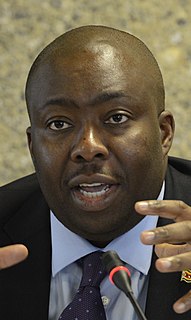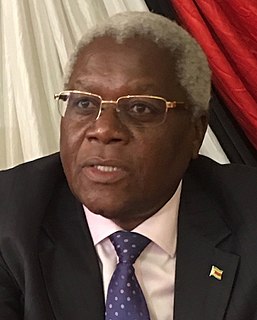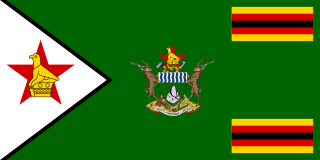Related Research Articles

The Zimbabwe African National Union – Patriotic Front (ZANU–PF) is a political organisation which has been the ruling party of Zimbabwe since independence in 1980. The party was led for many years under Robert Mugabe, first as Prime Minister with the Zimbabwe African National Union (ZANU) and then as President from 1987 after the merger with the Zimbabwe African People's Union (ZAPU) and retaining the name ZANU–PF, until 2017, when he was removed as leader.

Simbarashe Simbanenduku Mumbengegwi is a Zimbabwean politician and diplomat currently serving as Minister of State for Presidential Affairs and Monitoring Government Programmes. Previously he was acting Foreign Minister for a few days following the resignation of former President Robert Mugabe He had previously served as Zimbabwe's Minister of Foreign Affairs from 2005 to 2017. From October to November 2017, he was Minister of Macro-Economic Planning and Investment Promotion.
Herbert Muchemwa Murerwa is a Zimbabwean politician. He served as the Finance Minister of Zimbabwe from April 1996 to July 2000, from August 2002 to February 2004, and again from 26 April 2004 to 6 February 2007. He has been Minister of Lands and Land Resettlement since February 2009.

Saviour Kasukuwere is a Zimbabwean politician who served in the government of Zimbabwe as Minister of Local Government, Rural Development and National Housing between October and November 2017. He was also the ZANU–PF party's national political commissar until December 2017. Before that he was Minister of Youth Development, Indigenisation and Empowerment, and Minister of the Environment, Water and Climate. In October 2020, the Zimbabwe government sought Kasukuwere's extradition after issuing a warrant for his arrest. It was revealed that Kasukuwere was among loyalists of former President Robert Mugabe who fled to South Africa before their criminal trials could be completed.

Emmerson Dambudzo Mnangagwa is a Zimbabwean revolutionary and politician who has served as President of Zimbabwe since 24 November 2017. A member of ZANU–PF and a longtime ally of former President Robert Mugabe, he held a series of cabinet portfolios and was Mugabe's Vice President until November 2017, when he was dismissed before coming to power in a coup d'état. He secured his first full term as president in the disputed 2018 general election.
Sydney Tigere Sekeramayi is a Zimbabwean politician who served in the government of Zimbabwe as Minister of Defence between 2013 and 2017. He has been a minister in the Cabinet since independence in 1980, serving as Minister of Defence from 2001 to 2009 and Minister of State Security from 2009 to 2013.
Patrick Antony Chinamasa is a Zimbabwean politician who served in the government of Zimbabwe as the minister of various cabinet ministries. Previously he served as the Minister of Finance and Investment Promotion and the Minister of Justice, Legal and Parliamentary Affairs.
Oppah Muchinguri Kashiri is a Zimbabwean politician, who is the Minister of Defence in the Cabinet of Zimbabwe since 2018. She has also served as Minister of Higher Education and Minister of Women's Affairs. Muchinguri ran as the ZANU-PF candidate for Mutasa Central constituency in the March 2008 parliamentary election, but was defeated by Trevor Saruwaka, a candidate of the Movement for Democratic Change – Tsvangirai. According to official results, Muchinguri received 4,764 votes against 9,228 votes for Saruwaka.
Obert Moses Mpofu is a Zimbabwean politician, who served as Minister of Home Affairs from 2017 to September 2018. Previously he was Minister of Macro-Economic Planning and Investment Promotion; Minister of Industry and International Trade; Minister of Mines and Mining Development; and Minister of Transport and Infrastructure Development. The Cabinet of Zimbabwe was later dissolved on 27 November 2017. He was reappointed as Minister of Home Affairs in Mnangagwa's first cabinet on 30 November 2017. The Culture portfolio was added to his ministry. Mpofu was later removed from the Zimbabwe cabinet in September 2018.

Kembo Dugish Campbell Mohadi, is a Zimbabwean politician and former Vice-President of Zimbabwe who served from 28 December 2017 to 1 March 2021. He briefly served as the Minister of Defence, Security and War Veterans in 2017. Previously he was Minister of State for National Security in the President's Office from 2015 to 2017 and Minister of Home Affairs from 2002 to 2015.

Ignatius Morgen Chiminya Chombo is a Zimbabwean politician who was Finance Minister of Zimbabwe in 2017. Previously he has served in the Cabinet of Zimbabwe as Minister of Home Affairs from 2015–17, Minister of Local Government, Public Works and Urban Development from 2000–2015.
Joseph Mtakwese Made was a Zimbabwean politician who served as Minister of Agriculture.
Webster Kotiwani Shamu is a Zimbabwean politician and former Minister of Mashonaland West Provincial Affairs fired by President Emmerson Mnangagwa on 21 May 2018. He previously served as Minister of Information and Publicity, and Minister of State for Policy Implementation. He is a member of parliament representing the Chegutu constituency. The Cabinet of Zimbabwe was later dissolved on 27 November 2017.

The Cabinet of Zimbabwe is the executive body that forms the government of Zimbabwe together with the President of Zimbabwe. The Cabinet is composed of the President, the Vice-Presidents, and ministers appointed by the President. Until 1987, the Cabinet was chaired by the Prime Minister; it is now headed by the President.
The Ministry of Women Affairs, Community, Small and Medium Enterprises Development is a government ministry, responsible for gender and community issues in Zimbabwe. The most recent minister was Olivia Muchena since February 13, 2009 and the deputy minister was Evelyn Masaiti.

Walter Mzembi is a Zimbabwean politician. He previously served as Minister of Foreign Affairs and Minister of Tourism and Hospitality Industry. He was the Member of the House of Assembly for Masvingo South (ZANU-PF). It was announced on November 27, 2017 that Simbarashe Mumbengegwi was now the acting Foreign Minister of Zimbabwe. In October 2020, it was revealed Mzembi was among those who fled to South Africa before their criminal trials could be completed.
The Ministry of Public Service, Labour and Social Welfare is a government ministry, responsible for labour relations and welfare in Zimbabwe. Clever Nyathi was the incumbent minister until 2 December while the Joshua Malinga was appointed as the deputy minister for the portfolio of Social Welfare. Nyathi was replaced by ZANU-PF lawmaker Petronella Kagonye. It oversees National Social Security Authority. On November 27, 2017, Emmerson Mnangagwa, who succeeded ousted President Robert Mugabe following the 2017 Zimbabwe coup d'état, announced the dissolution of the Zimbabwe Cabinet, leaving only Patrick Chinamasa and Simbarashe Mumbengegwi as acting ministers of Finance and Foreign Affairs respectively.
Lazarus Dokora ) was the Zimbabwe Minister of Education, Sport and Culture. On 27 November 2017, Emmerson Mnangagwa, who succeeded ousted President Robert Mugabe, announced the dissolution of the Zimbabwe Cabinet, leaving only Patrick Chinamasa and Simbarashe Mumbengegwi as acting ministers of Finance and Foreign Affairs respectively. Dokora was an MP from Rushinga National Assembly, before losing to Wonder Mashange in the general elections in 2013. He was appointed as the Minister of Primary and Secondary Education on 30 November 2017 by President Emmerson Mnangagwa. He was dropped by Mnangagwa as Minister for Primary and Secondary Education on 2 December 2017 amidst Zimbabweans on social media and radio shows criticizing him, blaming him of poor performance and undermining the country’s education system. He was replaced by his deputy minister Paul Mavima. In relation to the issue with radio stations, he was interviewed by Farai Mwakutuya. The interview took place during a talk show called Head-On on radio ZI-FM.

The president of Zimbabwe is the highest office in the executive branch of the country's government. The president is head of state of Zimbabwe, elected by direct universal suffrage using a two-round system. Formerly a ceremonial role, the president is now also the head of government. The president serves a maximum of two five-year terms.
References
- ↑ "Cabinet sworn in amid chaotic scenes". NewZimbabwe.com. 13 February 2009. Archived from the original on 14 February 2009. Retrieved 13 February 2009.
- ↑ "Mnangagwa dissolves cabinet, Chinamasa appointed Acting Finance Minister". 27 November 2017.